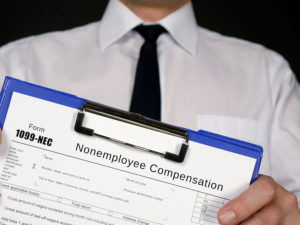Misclassifying employees as independent contractors deprives workers of minimum wages, overtime pay, and other employee-only benefits. Many employers purposely misclassify their workers as independent contractors just to improve their bottom line.
Our independent contractor classification lawyers fight your employer for every cent you are owed plus interest and civil penalties. We can usually achieve a favorable resolution through negotiation alone. But we are prepared to fight at trial for the largest jury award possible in your case.
How are independent contractors different from employees?
States have their own tests for determining what type of work creates an employer-employee relationship or an independent contractor classification. In general, workers with independent contractor status:
- have a shorter-term relationship with the company than employees do;
- can exercise more independent judgment and are under a lesser degree of control by the company than employees;
- play a less integral role in the company’s operations than employees do and performs work that is outside of the company’s usual business;
- have their own business where they perform similar tasks for multiple companies; and
- get paid a specific amount for a specific task to produce the desired result.
In addition, independent contractors do not have Medicare and social security taxes withheld from their paychecks: They have to pay the Internal Revenue Service (IRS) themselves through self-employment taxes.

Employers may try to misclassify a worker’s status as 1099 instead of W2 to avoid payroll taxes.
Although employees are more beholden to their employers than independent contractors are, employees do enjoy benefits that independent contractors do not. For instance, independent contractors are not guaranteed minimum wage pay or overtime wages under federal law or state law.
Additionally, many companies offer the following employee benefits that independent contractors cannot access:
- healthcare insurance, dental insurance, and vision insurance
- unemployment insurance
- 401K plans
- workers’ compensation insurance
- other wage and hour protections (such as rest and meal breaks)
In independent contractor misclassification cases that go to trial, some courts assume workers are employees until proven otherwise – even if they signed a contract where they agreed they were an independent contractor.1
In order to prove at trial that workers are independent contractors and not employees, employers have to satisfy the ABC test by showing that the worker:
- is free from the hiring entity’s control and direction re. work performance; and
- is doing work outside the hiring entity’s business; and
- is usually engaged in an independently established trade similar to what the worker is doing for the hiring entity.
California’s Court of Appeals, Third Appellate District, held that at trial, workers are not required to establish that the employer hired them before the employer has to satisfy the ABC test.2
What can I do if I was misclassified as an independent contractor?
If you are an employee who is being misclassified by your employer as an independent contractor, you may be able to:
- file a “wage claim” with your state labor commissioner or the U.S. Department of Labor’s Wage and Hour Division, or
- bring an independent contractor misclassification lawsuit
Many workers prefer to bring a wage claim through their state because the process is usually free and quick. And the labor commissioner typically offers mediation services to help settle any disputes without a hearing.
But every worker who has been misclassified is advised to first consult with an independent contractor classification lawyer about their legal options and which one will maximize their chances of realizing their goals.
Sometimes bringing a misclassification lawsuit is the best path forward. And if several of your co-workers are also being misclassified, an independent contractor classification lawyer can also discuss the possibility of banding together for a class action lawsuit (such as how many rideshare drivers have done against Uber and Lyft).
Note that in order for you and your co-workers to go forward with a class action lawsuit based on being misclassified as independent contractors, there are various requirements you must meet. One is the “predominance” requirement, which is that legal issues common to all of you predominate over issues affecting only some of you.3

Misclassified workers miss out on health insurance, unemployment benefits, and other perks.
What damages can I get if I win?
Depending on the circumstances of the case, employees who were misclassified as independent contractors may be able to recover the following damages:
- liquidated damages, which is double your unpaid wages and overtime pay plus interest;
- unpaid meal and rest breaks, plus interest;
- other benefits usually afforded employees (such as health insurance, etc.); and
- attorney’s fees and court costs.
And if your employer willfully misclassified you to get out of providing employee benefits (as opposed to committing a good faith error), you also may be able to recover substantial civil penalties as well.
In the rare event that your case reaches trial instead of settles, your independent contractor classification attorney can also ask the judge to award you punitive damages as well – which can often far exceed all your other monetary damages put together.4
How long do I have to file a lawsuit?
Every state has its own statute of limitations for bringing a legal action. So consult with an independent contractor classification attorney right away. The earlier you seek legal counsel, the more time they have to prepare a winning case.

Employment law attorneys can usually resolve misclassification cases without a trial.
For advice on your legal issues, contact our law firm today. Our employment lawyers practice throughout the state of California.
Legal References
- U.S. Department of Labor — Wage and Hour Division (WHD) — Fact Sheet 13: Employment Relationship Under the Fair Labor Standards Act (FLSA). See, for example, Dynamex Operations W. v. Superior Court (California Supreme Court, 2018) .
- Jose J. Mejia, et al. v. Roussos Construction, Inc. (Court of Appeal of California, Third Appellate District, 2022) 76 Cal. App. 5th 811. ABC Test, California Labor and Workforce Development Agency.
- See note 1. Fed. R. Civ. P. 23(b)(3). Bowerman v. Field Asset Servs., Inc., (9th Cir., 2022) 39 F.4th 652.
- See, for example, Roes v. SFBSC Mgmt., LLC (Ninth Circuit, 2019) 944 F.3d 1035.
